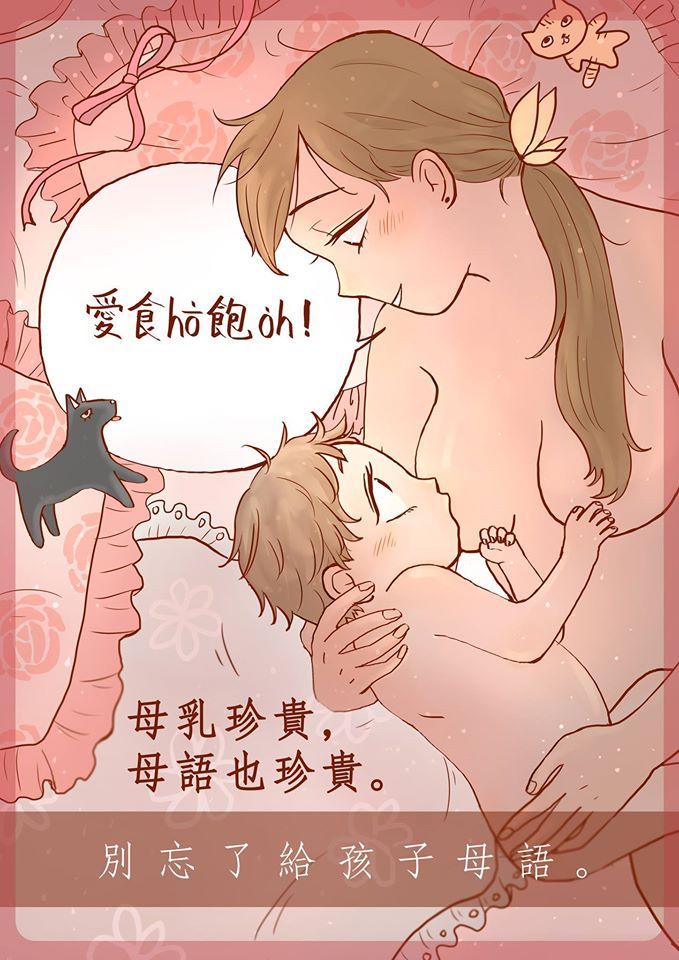Mother tongue is like mother's milk
« previous post | next post »
Pro-Taiwanese language poster on a wall in Tainan (courtesy of Tim Clifford):
Of course, the Taiwanese exclamation near the top is the most important part of this poster, but it is also the most difficult for me to explicate, so I will dispose of the rest of the writing first.
mǔrǔ zhēnguì 母乳珍貴
("mother's milk is precious")
mǔyǔ yě zhēnguì 母語也珍貴
("mother tongue is also precious")
bié wàngle gěi háizǐ mǔyǔ 別忘了給孩子母語
("don't forget to give your child its mother tongue")
Now for the Taiwanese sentence:
ài chia̍h hō· pá oh!
愛食hō·飽oh!
[you] should drink to [your] fill, uh!
The first character is interpreted as meaning "should; must; ought to", not "love" as in Mandarin.
The second character means "eat; drink", and the third character means "full".
My transliteration of the two Roman letter particles differs from that on the poster, since I'm following the usages of Grace Wu, Penn's Taiwanese language teacher, for the transcription of the whole sentence. Grace uses POJ (Pe̍h-ōe-jī, a Romanization system for Southern Min Sinitic) for her transcriptions and relies on Bernard L.M. Embree, chief ed., A Dictionary of Southern Min (Taiwanese-English Dictionary), based on current usage in Taiwan and checked against the earlier works of Carstairs Douglas, Thomas Barclay, and Ernest Tipson (Taipei: Taipei Language Institute [TLI], 1984) for definitions and grammatical parts of speech. Grace's father, George Hsin-yi Wu, TLI's former Director of Taiwanese Department, was one of the main compilers of this valuable dictionary of Taiwanese.
My Taiwanese informants gave widely discrepant explanations for the function of hō· in this and other sentences. Following the example sentences in the TLI A Dictionary of Southern Min, I consider the hō· in this sentence to be a marker of the complement of degree.
As for the "uh!" at the end of the English translation, I'm treating it as an English exclamatory particle (to match the "oh!" at the end of the Taiwanese sentence) as described in this enlightening and entertaining podcast episode:
"No-Uh! On the rise of an exclamatory syllable in English", by John H. McWhorter, Lexicon Valley Episode No. 130, Slate (3/6/18).
Selected readings
"Polyscriptal Taiwanese" (7/24/10)
"No character for the most frequent morpheme in Taiwanese" (12/10/13)
"A New Morpheme in Mandarin" (4/26/11)
"Writing topolects with Chinese characters" (4/1/18)
"Once more on the present continuative ending -ing in Chinese" (3/21/14)
Cheng, Robert L. (Zheng Liangwei) 1978. "Taiwanese Morphemes in Search of Chinese Characters" Journal of Chinese Linguistics, 6.2 (June): 306-314.
"How to Forget Your Mother Tongue and Remember Your National Language"
[h.t. Tim Clifford; thanks to Grace Wu, Melvin Lee, and Sophie Wei]

Victor Mair said,
June 16, 2018 @ 8:46 pm
From Chau Wu:
Here's another example sentence using ài as an auxiliary verb meaning 'must, ought to, should'. Say, I just wrote a check to pay a big bill, so I must go to bank to transfer money from savings to checking accounts:
Kin-á-ji̍t góa ài khì gîn-hâng sóa chîn.
今 仔 日 我 ài 去 銀 行 徙 錢
(Today I must go to bank to transfer money.)
Bathrobe said,
June 17, 2018 @ 11:56 pm
I must say, it is a very appealing poster for
mother's milkmother languages.mg said,
June 22, 2018 @ 2:13 pm
So refreshing to see breastfeeding shown as normal and not something to hide!